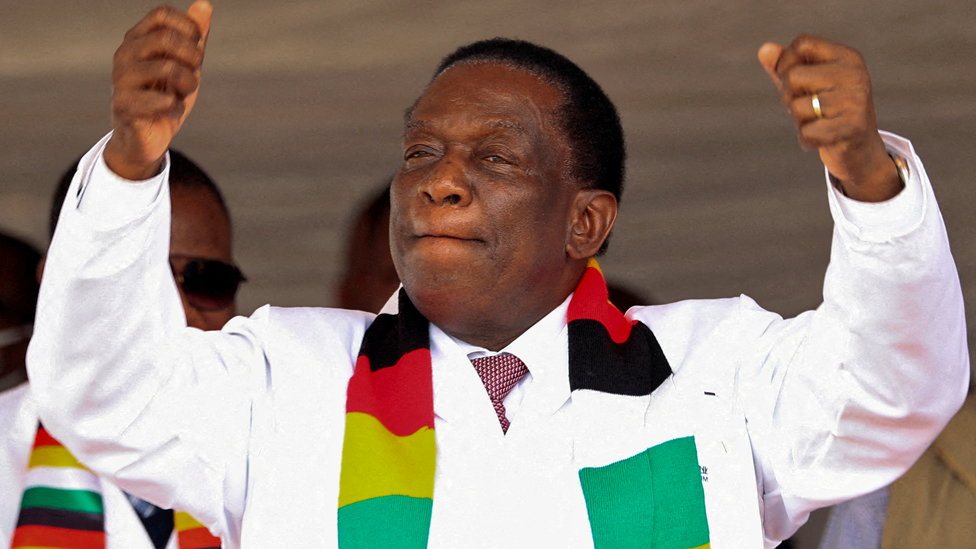
President Mnangagwa of Zimbabwe gives up on running for a third term in favor of changing the constitution
Pushing for a revision of the nation’s constitution, Zimbabwean President Emmerson Mnangagwa is reportedly trying to influence who would succeed him after he abruptly withdrew his candidacy for a third term.
After a military takeover in 2017, President Mnangagwa, 81, took office for the second and final time. However, there was already a vocal campaign underway to have him run for office again in four years.
Shortly after his divisive election of last year—which was deemed implausible by the majority of international observers—the eighty-year-old leader began to allude to a third term with campaign slogans implying he would still be in power in 2030.
Vice President Kembo Mohadi made the first public appeal for President Mnangagwa to stay in office during festivities on February 21, which honored the late Mr. Mugabe’s birthday.
A provincial minister named Ezra Chadzamira addressed President Mnangagwa during the same festivities, saying, “We all want you to stay in office beyond your presidential term.” In 2030, you will be present.
“I don’t have the power to say (I will stay) as this matter is in the hands of God,” the president stated at the time.
The third-term campaign seemed to be building steam, as seen by the factional realignments and sloganeering at governing party events that brought back memories of the Mugabe era, when ZANU PF succession disputes ultimately resulted in the military takeover six years prior.
President Mnangagwa said a week ago that he would not be seeking a third term, citing strong opposition from the security sector and even from inside his own ZANU PF party. The announcement followed his two terms as required by the law.
His administration is currently promoting constitutional changes that, according to observers, could undo significant electoral reforms that had been implemented after the Southern African Development Community intervened in 2008 to put an end to Zimbabwe’s ongoing dispute-filled elections.
The Zimbabwe Electoral Commission (ZEC) would lose some of its important duties, like voter registration, to a government department as part of the proposed constitutional amendments.
If the constitutional modifications go through as planned, a panel chosen by the president will also determine electoral borders instead of the independent elections administration agency.
The lower house of Parliament is currently in the leadership of President Mnangagwa’s government ZANU PF following the contentious recall of opposition lawmakers shortly after the 2023 elections.
Before the courts were utilized to prevent the lawmakers from running for office, an activist who claimed to be the secretary general of the main opposition Citizens Coalition for Change (CCC) was able to recall the lawmakers.
Nelson Chamisa, the leader of the CCC, was later compelled to leave the party in protest, claiming that some had taken over and were pushing for the Zimbabwean leader to seek a third term.
Opponents claim that if the proposed constitutional amendments are approved, President Mnangagwa will have the authority to select a successor, allowing him to maintain his political influence in Zimbabwe after his attempt to extend his tenure beyond two terms was unsuccessful.
The Zimbabwe Electoral Supervisory Network stated, “(The amendments will) further compromise the independence of ZEC by allowing separate government bodies to perform roles directly linked to the commission’s duties.”
“This will ultimately undermine citizens’ confidence and trust in electoral processes, jeopardizing the commission’s stewardship of elections.”
President Mnangagwa has been accused repeatedly during his tenure of using the law to establish a one-party state.
He rammed through 27 constitutional modifications in 2021, one of which eliminated the provision that called for the selection of a vice president to serve as a running mate.
Vice President Constantino Chiwenga was perceived to be removed from the succession contest by doing this.
Retired General Chiwenga, who is rumored to have presidential aspirations, led the coup that overthrew Mr. Mugabe as chief of the army.
The president appoints senior judges after consulting with the Judicial Service Commission; before, these appointments were submitted to public interviews. However, the constitutional revisions were also utilized to extend the tenure of these justices.
The judiciary, according to observer missions, was crucial in determining the outcome of the 2023 elections—a claim that Mr. Chamisa, his principal competitor, disputed.
The proposed constitutional reforms, according to the Crisis in Zimbabwe Coalition (CiZC), are intended to strengthen authoritarianism.
According to CiZC, “the proposed amendments to the Electoral Act will perpetuate Zimbabwe’s legitimacy crisis and further tarnish the integrity of Zimbabwe’s elections.”
The Coalition is appalled by the ongoing attempts to bolster political power and dictatorship through the mutilation of the constitution.
“It is unfortunate that the Zimbabwean constitution, which once served as a reflection of the people’s will, is now being used as a weapon by those who crave power to further their own self-interests.”
Given Zimbabwe’s past with Mr. Mugabe, constitutional law scholar Lovemore Madhuku stated that a third term run was always a dangerous idea.
Professor Madhuku declared, “This idea of a third term is totally undemocratic and ought not to be pursued.”
“To even consider a third term would be extremely retrogressive in our country, as we used to have a constitution that did not limit the number of terms that a person could serve as president. A person is better off in the first 10 years if they are fortunate enough to be in office twice.”
From Zimbabwe’s independence from Britain in 1980 until his abrupt exit from government, Mr. Mugabe presided over the country.
Up to the final days of his administration, President Manangagwa was his closest subordinate. However, they had a contentious disagreement about succession matters.
All Categories
Recent Posts
Tags
+13162306000
zoneyetu@yahoo.com



